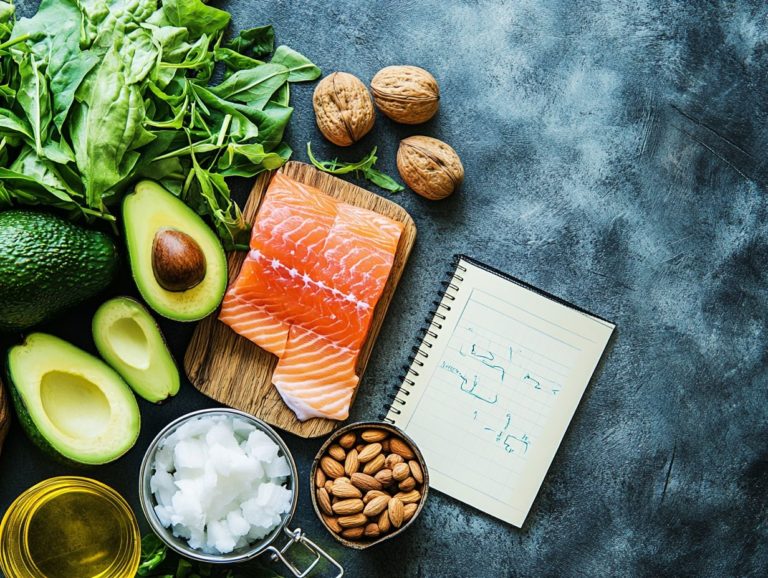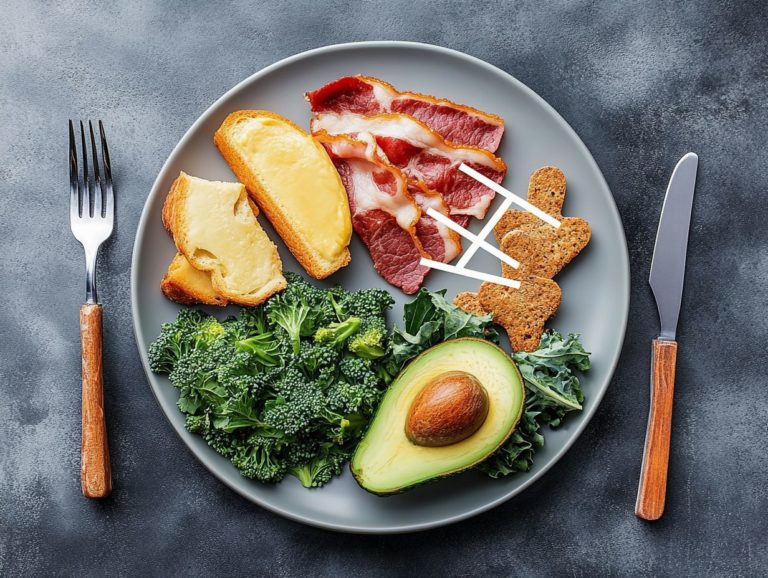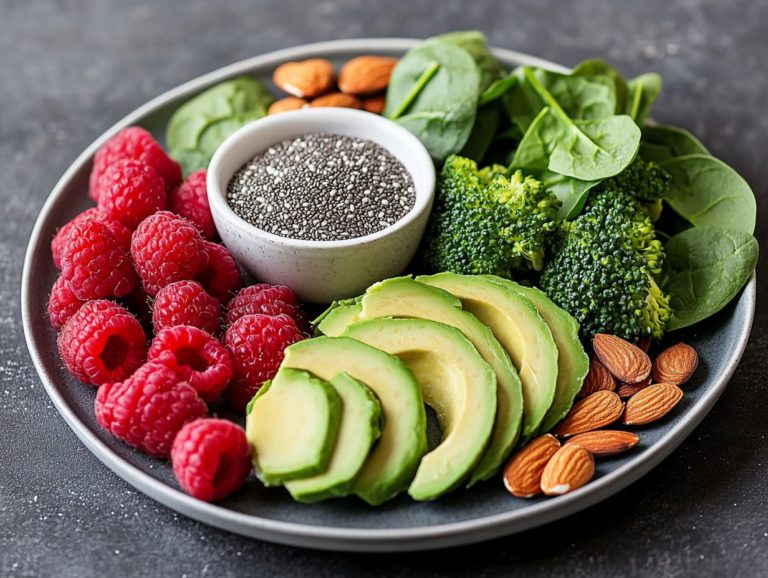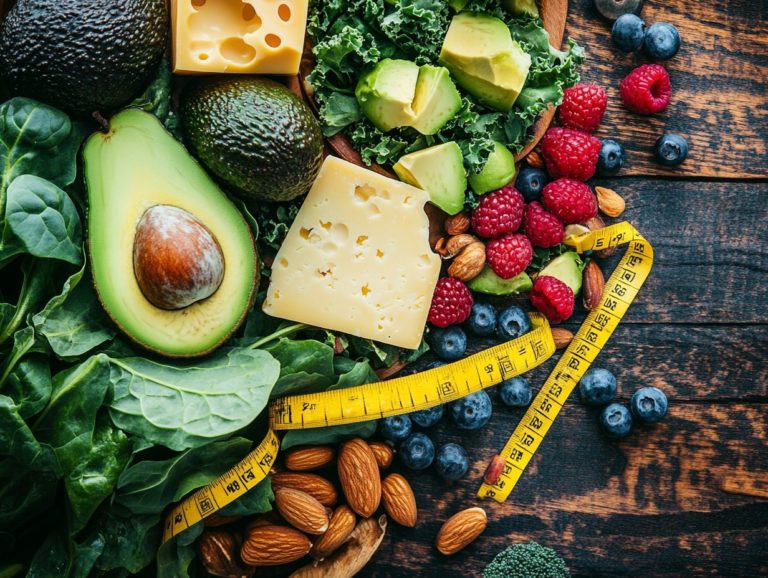Keto Diet: Balancing Nutritional Needs
The Keto diet has surged in popularity, hailed for its potential to revolutionize health and wellness through a low-carb, high-fat approach. Join the thousands transforming their lives today! It is similar to other popular low-carbohydrate diets such as the Atkins diet, Paleo diet, South Beach diet, and Dukan diet.
But what exactly does it entail, and how does it truly function?
In this article, you ll uncover the fundamentals of the Keto diet, explore its numerous benefits such as weight loss and enhanced energy levels and consider potential risks, including nutrient deficiencies and keto flu.
You ll also find practical tips for maintaining your nutritional balance while adhering to the diet, as well as guidance on how to transition off it safely.
Step inside to discover whether the Keto lifestyle could be the perfect match for you!
Contents
- Key Takeaways:
- What Is the Keto Diet?
- How Does the Keto Diet Work?
- What Are the Benefits of the Keto Diet?
- 1. Weight Loss
- 2. Improved Blood Sugar Control
- 3. Increased Energy and Mental Clarity
- What Are the Risks of the Keto Diet?
- How to Balance Nutritional Needs on the Keto Diet?
- How to Transition Off the Keto Diet Safely?
- Can Anyone Follow a Keto Diet?
Key Takeaways:

- Focus on whole foods and incorporate healthy fats to balance nutritional needs on the keto diet.
- Supplement with vitamins and minerals to prevent nutrient deficiencies while on the keto diet.
- Transition off the keto diet safely by slowly increasing carb intake and focusing on nutrient-dense foods while listening to your body’s needs.
What Is the Keto Diet?
The ketogenic diet, often referred to as the keto diet, is one of the many low-carb diets gaining traction, including the Atkins diet and Paleo diet. This meticulously crafted low-carbohydrate, high-fat dietary regimen is aimed at transforming your body’s metabolism from burning carbohydrates to utilizing fats for energy.
This metabolic state, known as ketosis, kicks in when you significantly reduce your carbohydrate intake, prompting your body to convert stored fat into ketone bodies, which serve as an alternative energy source.
The emphasis on high fat content, combined with controlled protein intake, sets the keto diet apart from many other dietary approaches. This unique structure allows you to enjoy specific permitted foods while restricting those that aren’t allowed, making it vital for you to understand your options within this framework.
How Does the Keto Diet Work?
The keto diet works by dramatically reducing carbohydrate intake, which leads to lower insulin levels and prompts the liver to convert fat stores into ketone bodies, ushering the body into a state known as ketosis.
In this state, fat emerges as the primary energy source, taking the place of glucose derived from carbohydrates. This shift not only elevates metabolic rate but also promotes weight loss and offers a range of health benefits.
Understanding this metabolic transformation is crucial, as the keto diet hinges on carefully regulated protein intake coupled with high-fat consumption, ensuring that energy levels are sustained and bodily functions are supported.
What Are the Benefits of the Keto Diet?
The ketogenic diet has emerged as a favored choice, not solely for its weight loss potential but also for the myriad health benefits that go beyond mere fat reduction. Many people discover improved blood sugar control, heightened energy levels, and enhanced mental clarity upon embracing the keto lifestyle. It can also offer therapeutic benefits for those with epilepsy, diabetes, Alzheimer s disease, polycystic ovary syndrome, and even certain types of cancer.
These advantages arise from the body s adeptness at utilizing fat for fuel, which can contribute to your overall well-being and potentially offer therapeutic benefits for a range of health conditions, including epilepsy and diabetes.
Are you ready to unlock your potential with the Keto lifestyle? Start your journey today!
1. Weight Loss
Weight loss stands out as one of the most compelling reasons for choosing the ketogenic diet. This approach effectively reduces body fat by shifting your body s energy source from carbohydrates to fats.
As you make this transition, you may notice a significant decrease in hunger and cravings. This is often attributed to the high-fat content and carefully adjusted macronutrient ratios of the keto diet.
By maintaining a state of ketosis, which is a metabolic state where your body burns fat for energy instead of carbohydrates, you can experience a more efficient fat-burning process, leading to effective weight management and loss.
When your body enters ketosis, it begins producing ketone bodies as an alternative fuel source. This enhances your energy levels while facilitating the utilization of stored fat for fuel. Research shows that individuals on a keto diet can lose up to 2.2 times more weight than those on standard low-fat diets within a similar timeframe.
The structure of the diet encourages a higher protein intake and limits insulin spikes, promoting a heightened metabolic rate essential for fat loss.
This multifaceted approach not only accelerates weight loss but also contributes to improved overall health and elevated energy levels.
2. Improved Blood Sugar Control
Improved blood sugar control is a significant advantage of the ketogenic diet, especially for those with diabetes or at risk of developing the condition. By cutting down on carbohydrate intake, the keto diet helps stabilize insulin levels and minimizes those pesky blood sugar spikes.
This leads to a more balanced metabolic response, which can be incredibly beneficial for managing diabetes. It allows for better control over glucose levels and, in some cases, even reduces reliance on medications.
Research studies indicate that individuals who embrace a ketogenic diet often experience enhanced insulin sensitivity, vital for maintaining optimal blood sugar levels. For instance, a study published in the journal Nutrition & Metabolism revealed that participants on a low-carbohydrate diet experienced a noticeable drop in fasting insulin and hemoglobin A1c both key markers of long-term blood sugar control.
While many individuals can reap the rewards, it’s crucial to approach the keto diet with caution, particularly if you have certain health conditions or metabolic disorders. Consulting with a healthcare professional before making any drastic dietary changes is essential. Additionally, learning how to maintain nutritional balance on keto can help you weigh the potential risks against the benefits, ensuring that the keto diet aligns perfectly with your unique health needs and goals.
3. Increased Energy and Mental Clarity

Many individuals report notable benefits from following the ketogenic diet, including increased energy levels and enhanced mental clarity. This boost is primarily thanks to the shift in energy sources from glucose to ketone bodies.
Ketones serve as a more stable energy source, offering a consistent supply of fuel for both your brain and body. This can lead to improved focus, cognitive function, and overall mental performance. If you’ve ever experienced energy crashes or struggled with concentration on high-carbohydrate diets, this effect is truly game-changing for many!
Scientific investigations are beginning to illuminate the fascinating relationship between ketone metabolism and brain health. Numerous studies suggest that the ketogenic diet may play a pivotal role in combating cognitive decline, especially for individuals facing neurodegenerative conditions like Alzheimer s disease.
By utilizing ketones, your brain could experience reduced oxidative stress and inflammation factors often associated with cognitive impairments. This metabolic shift not only enhances cellular energy production but may also improve synaptic function and provide neuroprotection.
As research continues to delve into these connections, the potential benefits of ketones as an alternative fuel source become increasingly clear, especially in therapeutic settings aimed at boosting cognitive resilience. The shift to ketone-based energy can also provide significant health improvements for individuals with metabolic disorders.
Ready to explore how the ketogenic diet can transform your health? Consult a healthcare professional today!
What Are the Risks of the Keto Diet?
While the ketogenic diet offers many benefits, it also comes with specific risks that you should consider before embracing this low-carbohydrate, high-fat lifestyle.
One common issue you might encounter is the ‘keto flu’, a collection of flu-like symptoms that can arise as your body adjusts to the state of ketosis. Another rare but serious condition is ketoacidosis, particularly in individuals with diabetes. The restrictive nature of this diet could lead to nutrient deficiencies, and there is also an elevated risk of developing kidney stones.
Be aware of these risks and develop strategies to manage them effectively as you embark on this dietary journey.
1. Nutrient Deficiencies
Nutrient deficiencies can creep in on your ketogenic diet if you re not careful to include a diverse array of allowed foods that deliver essential vitamins and minerals.
By restricting certain food groups, especially fruits and high-carb vegetables, you risk missing out on vital nutrients unless you make clever substitutions with non-starchy vegetables.
Plan your meals carefully to ensure you get all the nutrients you need! Including a variety of healthy fats, such as those found in avocados and olive oil, can help maintain a balanced diet.
Electrolytes like potassium and magnesium are crucial. If they re running low, you might experience fatigue and muscle cramps.
To replenish these nutrients, incorporate avocados, leafy greens, and nuts into your diet. You can also get your dose of vitamin C, typically found in fruits, through low-carb alternatives like bell peppers and broccoli.
A well-structured meal plan not only fills these potential nutritional gaps but also plays a key role in maintaining your energy levels and overall health. If you discover that dietary sources aren’t cutting it, consider high-quality supplements for electrolytes and vitamins to support your transition to a ketogenic lifestyle, particularly by understanding the nutritional needs for athletes.
2. Keto Flu
The term “keto flu” describes a collection of symptoms you might encounter when first transitioning to a ketogenic diet, as your body adapts to using fats for fuel instead of carbohydrates. You may experience common symptoms such as fatigue, headaches, nausea, and irritability, typically surfacing within the first week of starting the diet.
While these symptoms can be quite uncomfortable, they are generally temporary. You can often alleviate them through proper hydration, maintaining electrolyte balance, and gradually adjusting your carbohydrate intake.
Understanding the reasons behind keto flu prepares you for this adjustment period. As your body shifts from relying on carbohydrates for energy to embracing fat metabolism, you might face disruptions in both energy levels and hormonal balance.
The duration of these symptoms will vary, lasting anywhere from a few days to a couple of weeks, depending on your previous diet and metabolic state. It s essential to listen to your body during this time and make necessary adjustments, such as easing into the diet by gradually reducing carbohydrates and increasing fat intake.
This personalized approach can significantly help mitigate symptoms and make your transition much smoother.
Ready to start your keto journey? Make sure to prepare and plan your body will thank you!
3. Increased Risk of Kidney Stones
One potential risk you should be aware of while navigating the ketogenic diet is the increased likelihood of developing kidney stones. This is especially true if you’re not keeping your hydration levels in check. The high protein intake and shifts in your dietary habits can create a perfect storm for stone formation in those who are particularly sensitive. Hydration is crucial for everyone on the keto diet! Make it a priority!
Kidney stones typically form when substances like calcium, oxalate, and uric acid become overly concentrated in your urine. The ketogenic diet can unintentionally amplify these levels due to lower carbohydrate intake and a pivot toward richer fat and protein sources. To counter this risk, ensuring optimal hydration is key. Drinking enough fluids can help dilute these substances and support their excretion.
Be aware of foods high in oxalates, such as spinach and almonds, to make informed choices. If you notice severe pain or blood in your urine, don t wait! Seek medical advice immediately to prevent complications.
How to Balance Nutritional Needs on the Keto Diet?
Balancing your nutritional needs on the ketogenic diet requires thoughtful planning and a commitment to whole foods. This ensures you meet your nutrient intake while sticking to low-carbohydrate guidelines.
By prioritizing high-quality sources of healthy fats think olive oil and avocados and incorporating non-starchy vegetables, you can craft a well-rounded eating plan that supports both your ketogenic aspirations and overall health.
This approach not only allows you to savor a diverse range of foods but also ensures that you don’t overlook essential nutrients along the way.
1. Focus on Whole Foods

Focusing on whole foods is essential to the ketogenic diet. This approach enhances your health and minimizes the risk of nutrient deficiencies.
Prioritize whole foods like high-quality proteins, healthy fats, and non-starchy vegetables over processed options that typically hide sugars and unhealthy additives. By centering your meals around minimally processed foods, you can effortlessly meet your nutritional needs while learning how to balance nutrients on keto and guiding your body into ketosis.
Incorporating a diverse array of whole foods not only elevates the flavor and satisfaction of your meals but also delivers a wealth of vitamins, minerals, and fiber crucial for your overall well-being.
Consider fatty fish like salmon and mackerel; they’re superb choices packed with omega-3 fatty acids that support heart health. Don’t overlook avocados, either they’re brimming with potassium and healthy monounsaturated fats, making them a perfect fit for your keto lifestyle.
Leafy greens such as spinach and kale are low in carbs while offering vital nutrients.
By steering clear of processed options like sugary snacks or pre-packaged meals you can easily whip up nourishing dishes. Try a creamy avocado and salmon salad or a vibrant stir-fry brimming with colorful vegetables and grilled chicken. This way, you ensure your body receives all the nourishing benefits without the harmful elements often lurking in processed foods.
2. Incorporate Healthy Fats
Incorporating healthy fats into your ketogenic diet is essential for maintaining energy levels and supporting your overall health. Foods like olive oil, avocados, coconut oil, and nuts serve as excellent sources of healthy fats, helping you meet your daily nutrient goals while providing vital nutrients.
These fats not only ease your transition into ketosis but also promote satiety, making it easier for you to stick to your diet in the long run.
Understanding the different types of healthy fats enables you to choose foods that enhance your nutritional intake. Monounsaturated fats, found in avocados and olive oil, are particularly beneficial for your heart health. Meanwhile, medium-chain triglycerides (MCTs) in coconut oil can boost your energy and cognitive function.
To make your meals enjoyable and satisfying, consider options like scrambled eggs cooked in coconut oil for breakfast or a spinach salad drizzled with olive oil and topped with nuts for lunch. For healthy snacks, guacamole with pork rinds or nut butter on celery can hit the spot.
Just remember, portion control is key; even the healthiest fats can lead to calorie overload if you indulge too much.
3. Include Non-Starchy Vegetables
Including non-starchy vegetables in your ketogenic diet is essential for ensuring you get enough vitamins and minerals while keeping your carbohydrate levels in check. Think of vegetables like spinach, kale, broccoli, and cauliflower they’re nutrient powerhouses packed with fiber that offer significant health benefits without tipping the carb scale.
By incorporating a variety of these non-starchy vegetables, you can elevate your meals while satisfying your nutritional needs in line with keto principles. These vegetables also enhance the flavor and texture of various dishes and play a crucial role in your overall health.
They are excellent sources of antioxidants and will help maintain your digestive health thanks to their high fiber content.
To easily weave these nutrient-rich options into your daily meals, consider adding saut ed spinach to your omelets, tossing kale into your salads with a drizzle of olive oil and a squeeze of lemon, or using cauliflower rice as a base for your stir-fries.
Regularly consuming these vegetables can support your weight management efforts and boost your cardiovascular health, making them important allies on your keto journey.
4. Supplement with Vitamins and Minerals
Supplementing with vitamins and minerals can truly enhance your experience on the ketogenic diet, especially when addressing potential nutrient deficiencies that may arise from your limited food choices. Key nutrients like magnesium, potassium, and vitamin D are essential for maintaining your optimal health and preventing imbalances in your body.
Thoughtful supplementation not only supports your overall well-being but also amplifies the benefits of the keto diet when your food sources might not be enough. Since the keto diet often sidelines carbohydrate-rich foods, your intake of fruits, vegetables, and whole grains, which are typically packed with these vital nutrients, can take a significant hit. To maintain a balanced approach, consider learning how to balance your keto diet.
This situation underscores the importance of considering when and why supplementation might become necessary for you while following this high-fat, low-carb lifestyle. Take magnesium, for example. It s not just about muscle function; it plays a crucial role in energy production and can help alleviate common issues like cramping.
When selecting your supplements, choose high-quality options from reputable brands to ensure better absorption and effectiveness. Always consult with healthcare professionals, as some supplements can interact with prescribed medications, potentially affecting their efficacy or leading to unwanted side effects.
Your health is paramount, so taking these precautions will help you navigate your keto journey with confidence.
How to Transition Off the Keto Diet Safely?
Transitioning off the ketogenic diet demands a well-thought-out strategy to prevent potential weight gain and ensure your body can safely adjust to a higher carbohydrate intake.
By gradually increasing your carb consumption and prioritizing nutrient-dense foods, you can make this shift easier, allowing your body to adapt without dramatic changes in energy levels or weight.
A mindful approach to reintroducing carbohydrates will help you retain the benefits you’ve experienced during the keto diet while promoting lasting health and well-being. This is particularly important if you ve been following other low-carb diets like the Atkins diet or Paleo diet.
1. Slowly Increase Carb Intake
One of the most effective strategies for transitioning off the ketogenic diet is to gradually increase your carb intake, allowing your body to adjust without overwhelming its metabolic processes. This slow and steady approach helps maintain stable insulin levels and minimizes the risk of unwanted weight gain or energy crashes.
Carefully monitor your portion sizes and the types of carbohydrates you consume. This strategy allows you to ease back into a balanced diet similar to the South Beach diet or Dukan diet while still enjoying the benefits from your ketogenic experience.
To implement this change, aim to increase your carbohydrate intake by about 5-10 grams per week, gradually working toward a moderate level that aligns with your personal energy needs. Start by reintroducing whole food sources like sweet potatoes, quinoa, and legumes, which not only provide essential nutrients but also serve as a steady energy source. Including fruits, especially berries and apples, is particularly advantageous due to their fiber content, which aids digestion and helps you feel full.
It s essential to listen to your body s cues, making adjustments as needed to find a comfortable balance that promotes both your energy levels and overall well-being.
2. Focus on Foods Rich in Nutrients
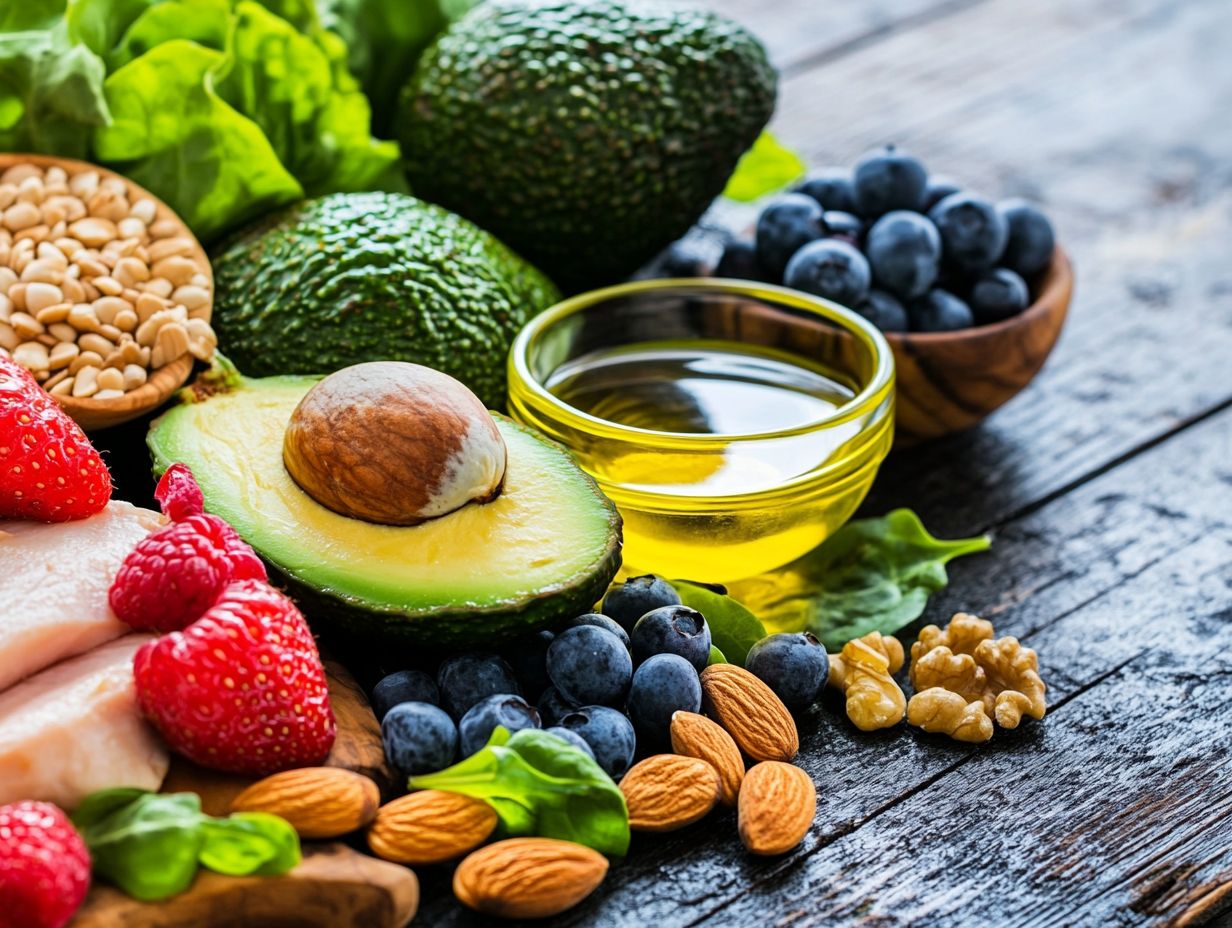
Focusing on foods rich in nutrients as you transition off the ketogenic diet is crucial for maintaining your health. By prioritizing whole, unprocessed foods that are brimming with vitamins, minerals, and fiber, you can ensure your diet remains balanced while gradually reintroducing carbohydrates. This thoughtful approach supports your overall well-being and helps prevent energy dips and cravings during this dietary change.
Incorporating foods like leafy greens, avocados, nuts, seeds, and lean proteins will provide you with essential nutrients without piling on excessive calories. These choices will assist in stabilizing your blood sugar levels, reducing the likelihood of those hunger spikes that often accompany dietary changes.
By opting for nutrient-rich options, you ll find it easier to regain a sense of fullness while still enjoying a diverse diet. Making intentional choices during this transition can help you maintain energy levels and continue to reap the benefits of a lower carbohydrate lifestyle.
3. Listen to Your Body
Listening to your body is essential when transitioning off the ketogenic diet, as individual responses to dietary changes can vary widely. By tuning into your hunger cues, energy levels, and overall sense of well-being, you can make more informed decisions about your food choices during this phase. Some people even find that dietary changes can impact conditions like Alzheimer s disease, highlighting the importance of personalized nutrition.
This mindful approach ensures that your transition remains positive and sustainable, allowing for adjustments based on your unique needs and preferences.
Recognizing signals from your body such as cravings, fatigue, or digestive changes can offer valuable insights into how to adjust your dietary selections. For instance, if you find yourself bloated or fatigued after reintroducing certain carbohydrates, it might be wise to reduce your intake or choose different sources altogether.
Keeping a food diary or jotting down your daily experiences can also help you identify patterns, enabling you to create a balanced diet that aligns with your evolving health goals.
Embrace this feedback and watch your journey transform into an exciting and enriching experience.
Frequently Asked Questions
What is a Keto Diet and how does it help in balancing nutritional needs?
A Keto Diet is a high-fat, moderate-protein, and very low-carb diet that helps the body achieve a metabolic state called ketosis. Ketosis is a natural process where the body burns stored fat for fuel instead of carbohydrates. This diet helps in balancing nutritional needs by providing essential nutrients through healthy fats and proteins while significantly reducing carb intake.
Explore more about nutrition and healthy eating habits to support your journey!
Can Anyone Follow a Keto Diet?
While a Keto Diet can benefit many people, it may not be suitable for everyone. Always consult a healthcare professional before starting any new diet, especially if you have existing health issues or take medications.
Pregnant and breastfeeding women should also avoid this diet.
What Food Options Can You Include in a Keto Diet?
Healthy fats like avocados, nuts, and olive oil are essential components of a Keto Diet. Protein sources such as eggs, chicken, and fish are also important.
Add low-carb vegetables like leafy greens, broccoli, and cauliflower to your meals. Be mindful of foods to avoid, such as sugar and high-carb grains, to maintain ketosis.
Can Vegetarians and Vegans Follow a Keto Diet?
Yes, a vegetarian or vegan Keto Diet is possible! However, it requires some extra planning and supplementation to ensure all nutritional needs are met. Incorporate plant-based protein sources like tofu, tempeh, and plant-based protein powders into your meals.
What Are the Potential Risks of Following a Keto Diet?
A Keto Diet can be beneficial for weight loss but may also have some potential risks. Some individuals may experience side effects like headaches, fatigue, or constipation during the initial adaptation phase.
Stay well-hydrated and consume enough electrolytes to prevent these side effects.
Can You Follow a Keto Diet Long-Term?
A Keto Diet can be followed long-term, but always consult a healthcare professional first. Ensure the diet is well-balanced and provides all necessary nutrients.
Regular blood work and check-ups can help monitor any potential risks and adjust the diet accordingly. Comparing various low-carb diets like the Paleo diet and Dukan diet can provide insights into what might work best for you.
Ready to try the Keto Diet? Consult with a professional today and start your journey to better health!

